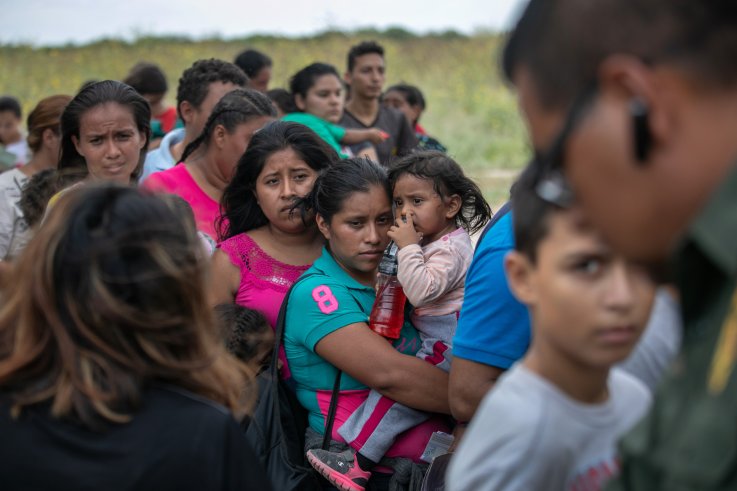Just when you thought the stories could not get any worse (and apparently this includes prisons too) another topic comes up: providing inadequate sanitary products to women and girls.
You would think that just about everyone, even men would understand these basic needs.
Apparently not.
FORCING IMMIGRANT GIRLS TO BLEED THROUGH THEIR UNDERWEAR IS CRUEL, DEGRADING AND DANGEROUS | OPINION
It was only a matter of time before President Donald Trump made headlines again over periods.
Just four years ago, in August 2015, he accused then–Fox News correspondent Megyn Kelly after the first presidential debate of having “blood coming out of her wherever.” The charge landed the once-taboo topic of menstruation smack in the middle of election coverage—and on the front page of nearly every major national and small-town newspaper in between. It even generated its own viral hashtag, #PeriodsAreNotAnInsult.
Now, 19 states filed a lawsuit in California this week against the Trump administration for the indefinite detention of and conditions endured by migrant children and their families. Among the charges of hygiene deprivation for children detained at the border—including the alleged lack of basics like toothpaste and bars of soap—is insufficient access to menstrual products and care. Testimony in the lawsuit included that: “Girl(s) at the facility…were each given one sanitary pad per day. Although the guards knew they had their periods, they were not offered showers or a change of clothes, even when the other girl visibly bled through her pants.”
For over a year now, the news of babies torn from parents has been devastating to absorb. And the detailed accounts of children’s days and nights in detention—of stench and filth, teens tending to toddlers, preschoolers appearing solo in court—have revealed the situation to be even worse.
But this week’s blaring headline “Trump Administration Leaves Menstruating Migrant Girls ‘Bleeding Through’ Underwear at Detention Centres, Lawsuit Claims” was an unexpected gut punch. Such cruelty and degradation are simply unfathomable.
Period shame is real, it is harmful, and it exists in every corner of the world. A global cohort of activists is working to counter that stigma and the damage it does. Here in the U.S., it has been dubbed the fight for menstrual equity. Access to products—as well as toilets, education and safe and accurate care—is an essential part of that agenda.
And, encouragingly, considerable progress has been made. For example, in an effort to ensure that menstruation doesn’t hinder students’ ability to succeed in school, four U.S. states recently passed laws requiring that pads and tampons be freely provided in school restrooms. Fourteen states now require a similar provision for incarcerated women—in county jails, state prisons and juvenile detention centers. Even Congress voted to do the same in 2018, passing a bipartisan prison reform package, the FIRST STEP Act that mandates menstrual access in federal correction facilities. (And, yes, Trump signed it into law.) Since 2016, another six states have passed laws exempting menstrual products from sales tax—eliminating the notorious “tampon tax” and making the case that menstrual products should be affordable for all.
But at the border right now, there’s no solace for young teens who might know little about what’s happening to their bodies—yet have to summon the courage to tell a male guard and ask for pads, only to be denied or given too few to matter. Or have to manage their periods in over-crowded rooms where privacy is scant. And aren’t even able to shower or wash hands or scrub clean stained underwear.
The harm extends beyond all surface cruelty too. There are serious potential health risks, some fatal, that come from using a pad or tampon for too long, ranging from infection to toxic shock.
As a matter of policy, compassion and common sense, menstrual equity should be a no-brainer. But we are far from a nationwide mandate.
Which is where the courts come in. And why it is heartening to see this testimony—horrifying as it is—featured as part of the formal court record. For as a matter of law, there are viable, though still untested, arguments to support the case for menstrual equity: namely, that deprivation of basic needs like safe, affordable tampons and pads may amount to a violation of due process, sex-based discrimination under the equal protection clause, or both.

Last year, California criminal defense attorney Paula Canny filed a class-action lawsuit in Sacramento arguing that denying free tampons to people held in county jails is unconstitutional. Her action prompted numerous counties to ensure the provision of menstrual products. And a new legal campaign launched this summer—Tax Free. Period.—to mobilize lawyers to challenge the tampon tax in court. Constitutional law scholar and Dean of U.C. Berkeley Law Erwin Chemerinsky made the case for the illegality of the tampon tax in a recent Los Angeles Times op-ed. And the director of Columbia Law School’s Center for Gender and Sexuality Law, Katherine Franke, told The New York Times that these legal claims, overall, “highlight a day-to-day way in which women experience discrimination in one of their most basic bodily functions.”
Fighting to have menstrual equity enshrined into our jurisprudence is a key step toward permanent, meaningful change. And a way to ensure that no one—especially a child in crisis—is shamed or harmed simply because they menstruate.
Jennifer Weiss-Wolf is vice president and women and democracy fellow at the Brennan Center for Justice at NYU Law, and author of Periods Gone Public: Taking a Stand for Menstrual Equity.
The views expressed in this article are the author’s own.


Reblogged this on Justice for Everyone Blog.
Can we send clothes ? Can we help
Now that’s a very sweet thought but you have to understand how this whole system works. It’s a for-profit prison system basically where the lawmakers get a cut for every person that is house there because they take campaign contributions to tighten up laws and put more people in prison. So if anyone son’s clothes that means it’s some clothing and washing company who is tied in will not get their vig are very important gain
.
that’s why toys blankets and clothes are traditionally turned away at these institutions and they are just tossed in the garbage. If people entertainment centers got any kind of help then the tied in prison systems vendors won’t be able to make money
It’s really sad to see this. If a girl doesn’t have clean clothes in her physiological period, it’s a sad thing. I met such poor children before, and then I bought some cheap clothes for them on the Internet. This is the website. If you are interested, you can join me.
http://everyoung.ebcoo.net/product/embroidered-hoodies-cartoon-trendy-cute-streetwear/
I’m not sure what the attack against ********* is all about, conditions at illegal immigration holding centers were FAR worse ****** just not publicized.
I’m sorry but this website is run by a 501 c 3 and we cannot publish any poliital statement for or against any candidtates. We just hope everything will be cleaned up soon.